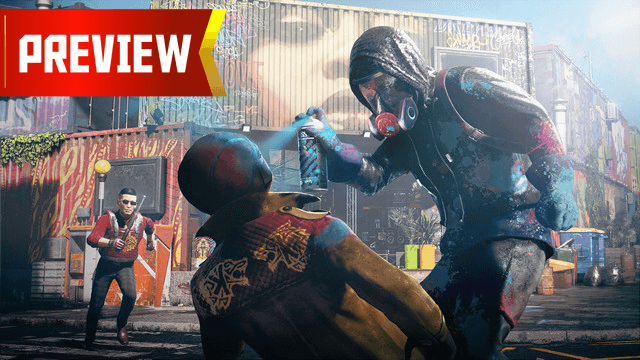I played Watch Dogs: Legion ahead of Ubisoft’s Forward stream and was able to get an extensive preview of what the game has to offer. I was able to put Legion‘s most prominent feature, the ability to recruit and play as any NPC, through the paces. I got a feel for what life in near-future London is like over four hours of gameplay.
The Watch Dogs series has been a mixed bag so far. The first title had a lackluster story featuring an unlikeable protagonist, but its “hack anything” gimmick proved engaging enough to warrant a sequel. Luckily, Ubisoft moved away from Aiden Peace’s brooding to a more colorful cast in Watch Dogs 2. The game was all the better for taking a more light-hearted approach in balmy San Fransisco.
Legion is at its core still very much a Watch Dogs game, for better or for worse. The overall tone of the game is a combination of its two predecessors. There’s a certain degree of humor and zaniness about the core members of Dedsec. Still, the situation in London is much darker than what we saw in San Fransisco.
Watch Dogs: Legion Preview | London falling
The inciting action of Watch Dogs: Legion is a massive terrorist attack in London. Several major locations are destroyed simultaneously, and Dedsec is framed for the bombings. In the aftermath, the UK government calls upon private military corporation Albion to implement measures to prevent future attacks.
With the assistance of newly formed Signal Intelligence Response Service (SIRS), Albion installs an unparalleled surveillance apparatus. Checkpoints throughout the city scan citizens and vehicles that pass through them. Drones patrol the skies. Private security guards almost wholly replace the City of London Police, Metropolitan Police, and British Transport Police.
The London citizenry tolerates the new measures, but resentment festers underneath the surface. Albion’s security is invasive. The private police that prowls the streets are little more than thugs, intimidating, assaulting, and arresting people for the smallest infractions. Several years pass, and Dedsec reforms, but this time it’s not just a hacktivist group. Dedsec now represents an entire resistance movement, one you have to build from the bottom up as part of the game.
Dedsec won’t be built as part of a cutscene. Instead, you have to hit the streets of London and do it yourself. When I first heard of that Legion would let you play as anyone, I saw the phrase in quotation marks. I thought there’d be certain NPCs that you could recruit, with the majority being barred from interaction. However, that’s not the case. You really can recruit any NPC you meet.
Watch Dogs: Legion Preview | The life of an NPC
Each NPC starts as, well, an NPC. They’re very shallow and are little more mechanically than background noise. However, when you begin taking an interest in one, by profiling them and adding them as a potential recruit, the game ramps up their simulated life. It’s a cool enough feature in and of itself, but it also has a gameplay use.
Each NPC has opinions about Dedsec, and you can’t just sweep them off their feet and into the group. Most of London’s citizenry is neutral towards the group. Some, like protest leaders, are more apt to be receptive to your recruiting efforts. Others, like Albion’s employees or police officials, are tougher to crack. You won’t want to ignore the harder-to-recruit citizens, either. Many of them have access to restricted areas which you can exploit. Being able to stroll in the front door is a lot easier than having to stealth through a whole building. Using the Deep Profiler, you can look into an NPC’s life and identify areas where you can sway their opinion.
Once an NPC is receptive to your message, you can speak with them directly about joining Dedsec. They’ll send you on a recruitment mission which has you performing a task for them. Upon completion, they’ll officially join up, and you can switch to them from the menu.
Since your player character is one of the multiple NPCs you recruit to Dedsec, there’s no primary protagonist in the game. The main character of Watch Dogs: Legion is whoever you’re playing as at any given time. In cutscenes, there are many role archetypes which your player character may take. If you’re playing as an MI5 agent, their lines may be delivered in a suave, proper, and crisp way. Alternatively, a construction worker may have a deep cockney drawl.
Fortunately, there’s no awkwardness with multiple recruits having the same voice. Ubisoft uses voice modulation tech to great effect in Watch Dogs: Legion. This also helps with the immersion-breaking trend in open-world games of hearing the same line of NPC dialog in the same voice over and over.
Watch Dogs: Legion Preview | Lethal weapon
Outside of the recruitment system, Watch Dogs: Legion plays much like its predecessors. The “hack everything” paradigm is still in effect, though it’s limited more by which character you’re using than a skill tree. Hacking is less of a gimmick in this game than it was in the two previous entries, though. The missions I played allowed plenty of opportunities to use hacking or a drone to complete objectives, but they weren’t required. The option to go more hands-on by using either combat or stealth instead of being shoehorned into one particular solution is welcome.
Also welcome, is the additional non-lethal options. You’re trying to recruit (and later liberate) the population, so it wouldn’t make much sense to run around capping everyone with impunity. Each lethal options, pistols, shotguns, submachine guns, had a non-lethal counterpart from what I saw. Unfortunately, non-lethal options are terrible. For example, the pistol shoots out little bolts of electricity (which I assume is some taser), which have limited range and are almost entirely stopped by armor, meaning most enemies are going to require a headshot. Alternatively, the lethal pistols fire faster and cause more damage in general. The game is still a work-in-progress, so I’m sure it’ll go through multiple balance passes before launch. However, right now, a non-lethal run is essentially playing the game on hard mode.
Unfortunately, four hours with the game wasn’t long for me to see the repercussions of lethal vs. non-lethal gameplay. I assume that there must be some behind-the-scenes calculations that make potential recruits warier of Dedsec if you use deadly force, but I’m not sure.
Watch Dogs: Legion Preview | Paradigm shift
I’m excited to see more of Watch Dogs: Legion, but I’m not sure how the gameplay design will work out over a full playthrough. During my time previewing the game, I was engrossed in learning about London, doing missions, recruiting new Dedsec members, and learning about the game’s ins-and-outs. However, it remains to be seen if the recruitment system is a gimmick or something that will revolutionize open-world gameplay.
“Emergent storytelling” is a buzzword we’ve heard time and again. Most open-world games try to provide this type of narrative in some form or fashion. However, the reality is that most of the time, players following the story of an open-world game, regardless of how many approaches the developers say there are, are going to have the same experience. However, Watch Dogs: Legion, with its large amount of NPC types, seems to be designed to bring the elusive emergent narrative to life.
The big “if” for Watch Dogs: Legion is whether or not recruiting Dedsec members continues to be a pleasurable experience over the tens of hours this game will take to complete. Procedurally generated content can be fun but lacks the flair of hand-crafted content. Hopefully, this game’s melding of the two finds the synergy for which the industry has been striving for years.











